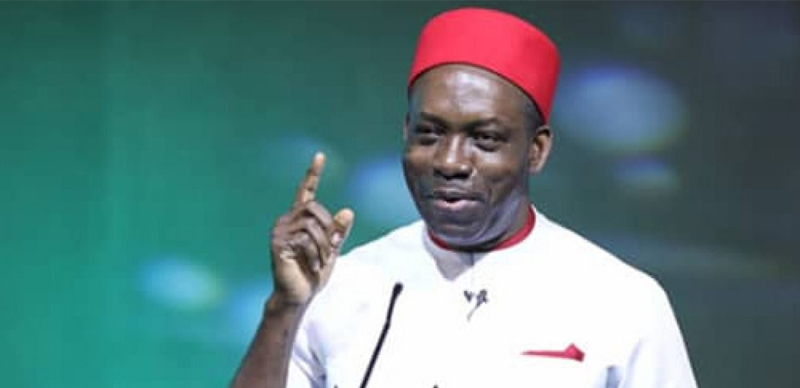
Can Professor Charles Soludo go the whole hog? Can the reformist -minded Governor of Anambra State sustain the march for ‘disruptive change’ in the state? That these and similar questions are being asked about the bearing of the government suggests a threshold of hope. Eight months on, the sure -footedness with which the administration took off, has not been significantly altered. What are the prospects of this leadership?
It’s so heart-warming to hear the Governor say, “I applied for this job”, as he has done on several occasions. These were during the times of serious challenges to the mission of a prosperous and livable Anambra State. With the declaration, Soludo sought to reassure Ndi Anambra that, as difficult as the mission was proving, he would not make excuses but only strive harder at the task.
Leadership theory and practice emphasise vision, capacity and the disposition to take tough decisions. Israelmore Ayivor said, “Leaders say ‘no’ to corruption. Anyone playing a role in governance and is not ready to do this is not a leader.” Ayivor’s submission is particularly germane to the Nigerian situation.
One of the challenges that soon confronted the Anambra State helmsman was the roar of impunity that has held down Nigeria’s potential as an orderly, modern nation-state. The spectre of illegal structures that kept impeding town planning and safety regulations is all too known. The immediate past Willie Obiano administration made strong efforts to counter the malpractice but greedy citizens, who felt that everyone has a price, kept trying. They built structures on waterways, under high voltage lines, at green areas and other unapproved places. Now, they have run into a brick wall.
The demolition of illegal structures started in May 2022 at Onitsha and Okpoko suburbs after the issuance of notice. This is a laudable step for every progressive citizen but society will always have self-centred, parochial members and the tribe of perpetual critics ever finding fault with what others do. The disruptive agents queried the importance of correcting physical distortions of the environment, described the exercise as diversionary; thereby lamenting the losses by owners of the structures. This is a disingenuous portrayal of the villain as victim – a sentimental thread that some hold on to in the streets. But a major test of leadership is to hold on to the larger good in overriding public interest. Soludo has stayed focused with the restoration campaign continuing. In October, the state capital, Awka, felt the impact of the renewal, especially in the bustling Club Road. Mercifully, the first steps for taming the jungle emerging in the area had been taken.
This should not be misconstrued as celebrating people’s misfortune. Nevertheless, there should be limits to people’s indulgence.
Why would citizens not seek due approval before embarking on constructions? The defence of falling into the hands of corrupt officials who authorised the structures will not suffice. Did the officers approve for free? Does anyone not know that outfits very close to the road are not permissible? Or, that there are health and safety hazards that must be avoided?
The conflict with the revenue gangs is much more intense. Anambra’s commerce-oriented society had long made poaching of government revenue a lucrative undertaking. From market levies to motor park fees to income tax, scores of gangs with fake receipts extorted people of their hard-earned money. Their violent methods have cost lives and maimed limbs. In a notable, stupid display of their daring, a fellow drew Mr Peter Obi aside, in the early days of his governorship in 2006, and told him to hands off luxury park revenue in Onitsha for his own good! It’s no surprise then that the digital revenue system and designated collection points introduced by the present government is being resisted by beneficiaries of the old order. The good news, however, is the commencement of operations by the Anambra Joint Enforcement Team to ensure compliance with the new directives. And hawkers, barrow pushers and others on the lowest rung are excluded from taxation.
Again, decisiveness was displayed on September 11, 2022 when the state government moved against an impostor parading as traditional ruler of Awka. Security agents were deployed to seal off the usurper’s residence as he planned to perform a function of the traditional ruler despite warnings to the contrary. The government’s action was widely applauded for not condoning the antics of this serial offender. It sent a clear message that no one should see themselves above the law and that the administration was prepared to take on the challenges in furtherance of good governance.
Soludo has also taken the difficult decision to resuscitate the abandoned Anambra State Government House project. The complex, which was discontinued 20 years ago, following disputes with the contractor, will require N6bn to complete. While some may question the priority of the project, the benefit in cutting the losses of the state government needs to be appreciated. At 60 per cent development attainment, the case for completion is strong. Delivery on the complex will free up the present Governor’s Lodge for other uses, an important gain for a state still lacking some critical infrastructures.
Can Soludo go the whole hog? The answer, at least, partly lies with continued citizen support. The Former American First Lady, Rosalyn Carter, stresses the place of leadership by saying, “A leader takes people where they want to go. A great leader takes people where they don’t necessarily want to go, but ought to be.”
Afuba is Director, Public Administration Axis, Awka.





